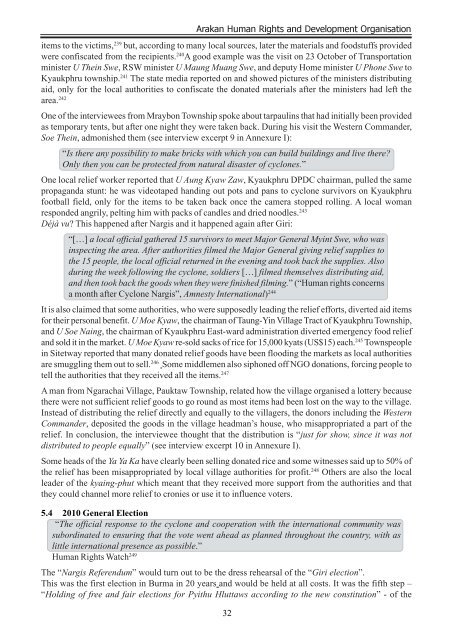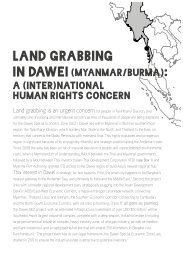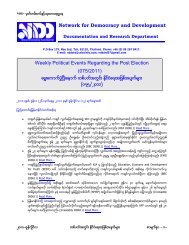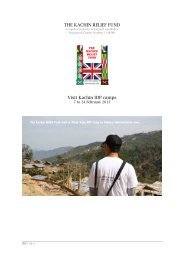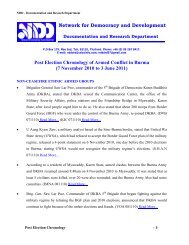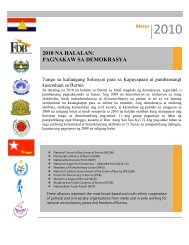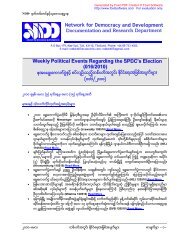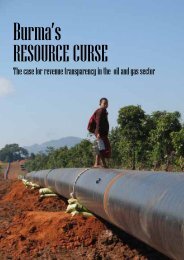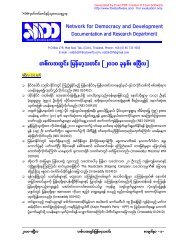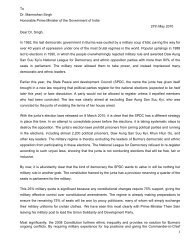Cyclone Giri - Two Years On - Burma Action Ireland
Cyclone Giri - Two Years On - Burma Action Ireland
Cyclone Giri - Two Years On - Burma Action Ireland
Create successful ePaper yourself
Turn your PDF publications into a flip-book with our unique Google optimized e-Paper software.
Arakan Human Rights and Development Organisation<br />
items to the victims, 239 but, according to many local sources, later the materials and foodstuffs provided<br />
were confiscated from the recipients. 240 A good example was the visit on 23 October of Transportation<br />
minister U Thein Swe, RSW minister U Maung Muang Swe, and deputy Home minister U Phone Swe to<br />
Kyaukphru township. 241 The state media reported on and showed pictures of the ministers distributing<br />
aid, only for the local authorities to confiscate the donated materials after the ministers had left the<br />
area. 242<br />
<strong>On</strong>e of the interviewees from Mraybon Township spoke about tarpaulins that had initially been provided<br />
as temporary tents, but after one night they were taken back. During his visit the Western Commander,<br />
Soe Thein, admonished them (see interview excerpt 9 in Annexure I):<br />
“Is there any possibility to make bricks with which you can build buildings and live there<br />
<strong>On</strong>ly then you can be protected from natural disaster of cyclones.”<br />
<strong>On</strong>e local relief worker reported that U Aung Kyaw Zaw, Kyaukphru DPDC chairman, pulled the same<br />
propaganda stunt: he was videotaped handing out pots and pans to cyclone survivors on Kyaukphru<br />
football field, only for the items to be taken back once the camera stopped rolling. A local woman<br />
responded angrily, pelting him with packs of candles and dried noodles. 243<br />
Déjà vu This happened after Nargis and it happened again after <strong>Giri</strong>:<br />
“[…] a local official gathered 15 survivors to meet Major General Myint Swe, who was<br />
inspecting the area. After authorities filmed the Major General giving relief supplies to<br />
the 15 people, the local official returned in the evening and took back the supplies. Also<br />
during the week following the cyclone, soldiers […] filmed themselves distributing aid,<br />
and then took back the goods when they were finished filming.” (“Human rights concerns<br />
a month after <strong>Cyclone</strong> Nargis”, Amnesty International) 244<br />
It is also claimed that some authorities, who were supposedly leading the relief efforts, diverted aid items<br />
for their personal benefit. U Moe Kyaw, the chairman of Taung-Yin Village Tract of Kyaukphru Township,<br />
and U Soe Naing, the chairman of Kyaukphru East-ward administration diverted emergency food relief<br />
and sold it in the market. U Moe Kyaw re-sold sacks of rice for 15,000 kyats (US$15) each. 245 Townspeople<br />
in Sitetway reported that many donated relief goods have been flooding the markets as local authorities<br />
are smuggling them out to sell. 246 Some middlemen also siphoned off NGO donations, forcing people to<br />
tell the authorities that they received all the items. 247<br />
A man from Ngarachai Village, Pauktaw Township, related how the village organised a lottery because<br />
there were not sufficient relief goods to go round as most items had been lost on the way to the village.<br />
Instead of distributing the relief directly and equally to the villagers, the donors including the Western<br />
Commander, deposited the goods in the village headman’s house, who misappropriated a part of the<br />
relief. In conclusion, the interviewee thought that the distribution is “just for show, since it was not<br />
distributed to people equally” (see interview excerpt 10 in Annexure I).<br />
Some heads of the Ya Ya Ka have clearly been selling donated rice and some witnesses said up to 50% of<br />
the relief has been misappropriated by local village authorities for profit. 248 Others are also the local<br />
leader of the kyaing-phut which meant that they received more support from the authorities and that<br />
they could channel more relief to cronies or use it to influence voters.<br />
5.4 2010 General Election<br />
“The official response to the cyclone and cooperation with the international community was<br />
subordinated to ensuring that the vote went ahead as planned throughout the country, with as<br />
little international presence as possible.”<br />
Human Rights Watch 249<br />
The “Nargis Referendum” would turn out to be the dress rehearsal of the “<strong>Giri</strong> election”.<br />
This was the first election in <strong>Burma</strong> in 20 years and would be held at all costs. It was the fifth step –<br />
“Holding of free and fair elections for Pyithu Hluttaws according to the new constitution” - of the<br />
32


